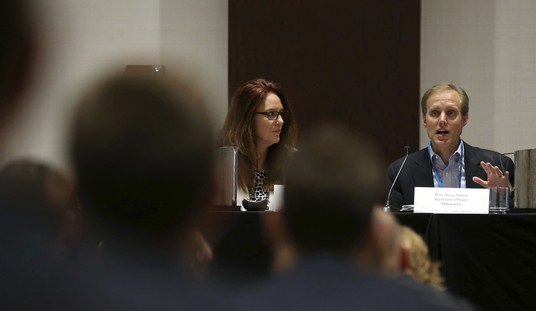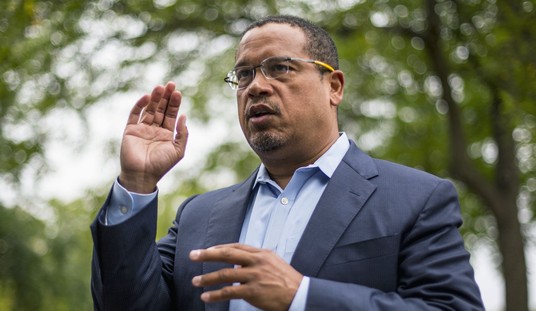This story has already been making the rounds this weekend, but it’s worth a look more from the perspective of media responsibility and ethics than studying the actual events in Benghazi. CNN has already come clean and admitted that their reporters found the charred remains of the personal journal of Ambassador Chris Stevens in the burned out frame of the consulate.
Three days after he was killed, CNN found a journal belonging to late U.S. Ambassador to Libya Chris Stevens. The journal was found on the floor of the largely unsecured consulate compound where he was fatally wounded.
CNN notified Stevens’ family about the journal within hours after it was discovered and at the family’s request provided it to them via a third party.
The journal consists of just seven pages of handwriting in a hard-bound book.
When you tell the story that way, it sounds like no harm, no foul, right? Journal found… family contacted…. journal returned. But, as the Lonely Conservative notes, there were a few more stops on this particular train route than CNN fesses up to.
[T]he Stevens family asked CNN not to report on information found in the dead man’s diary – but of course CNN did it anyway. Anderson Cooper was part of the sick cabal responsible.
Family members and State Department officials said CNN agreed during the Sept. 14 conference call to hold off on using the diary until the family had a chance to review its contents.
But family members and U.S. officials were surprised when CNN anchor Anderson Cooper appeared to use the information from the journal by attributing it to a source familiar with Mr. Stevens’s thinking.
In that broadcast, Mr. Cooper said the ambassador was worried about security threats in Benghazi and said he believed he was on an al Qaeda hit list.
A spokesperson for CNN said the network didn’t report directly from the journal, but corroborated the information through other sources.
According to the linked WSJ article, the State Department revealed that it took “repeated prodding” to get CNN to return the journal to the family, and calls for them to hold off on using the information within were clearly ignored. Unless, of course, you accept Anderson Cooper’s explanation that “confirming” the information in the journal with “sources familiar with the Ambassador’s thinking” qualifies as not using it.
Where can we expect the media to draw the line on something like this? Is the personal journal of a dead man not off bounds? (Though clearly the State Department deserved a look at it.) A private journal is not some official government document obtained through a Freedom of Information request. And they can’t claim that it’s the same as an interview. (I’ve done more than a few myself.) When a reporter wants to ask about your private musings, you can refuse. Or, at a minimum, insist that the conversation is off the record. Ambassador Stevens had no such opportunity. CNN tore into his book, whipped out their cell phones and began getting ready to go to press over the objections of the dead man’s family.
At what point can the public, if not the government, cry foul over something like this? I got into a bit of an argument with my friend Doug Mataconis over that question when the story broke. In the discussion, he voiced the opinion that the contents of the journal were newsworthy, and as such, it might be irresponsible of CNN to not use it. We agreed to disagree, but he penned a lengthy piece on it later.
CNN is getting hammered for using the diary as a news source rather than giving it to the family as they requested or, as some have suggested, turning it over the government as “evidence” in the terror attack. It’s very tempting to be sympathetic to Stevens’ family and to argue that the journal should have been returned to them immediately. However, there’s also the fact that that Stevens’ journal apparently did contain material indicating the Ambassador’s concerns regarding the security situation for American diplomats in Libya as well as warning of attacks and security threats in the Benghazi area and elsewhere. These concerns were apparently corroborated by other information obtained by CNN reporters on the ground. Doesn’t this make at least this part of the journal newsworthy? If an Ambassador in a nation like Libya is expressing private concerns about his own security in the weeks and months before his death, isn’t that relevant information that the American public should know as we continue to uncover exactly what happened on September 11, 2012 in Benghazi? I understand the people who are sympathetic to the wishes of Stevens’ family and the idea that they should have been followed, but it strikes me that there are other obligations that journalists owe to their audience, and it strikes me that CNN would have been doing a disservice by choosing not to report this information.
As to the argument that this is “evidence”, I’m not really sure what it would be evidence of unless Stevens was writing a contemporaneous account of the attack while hiding in the Consulate, which doesn’t appear to be the case. Furthermore, even if it is “evidence,” it’s also newsworthy and, unless it involved something secret that would have jeopardized an investigation, or jeopardized lives, I don’t see the “evidence” argument as one that should have precluded CNN from making the information public.
I just don’t see it that way. If there were information in there critical to national security and of value to the public, the proper route would have been to simply allow State to handle the pages and determine how much to give out at a press briefing, hopefully respecting the wishes of the family. In this case, I think there is still a line of decency which professional journalists should observe. And in this case, it was crossed.








Join the conversation as a VIP Member